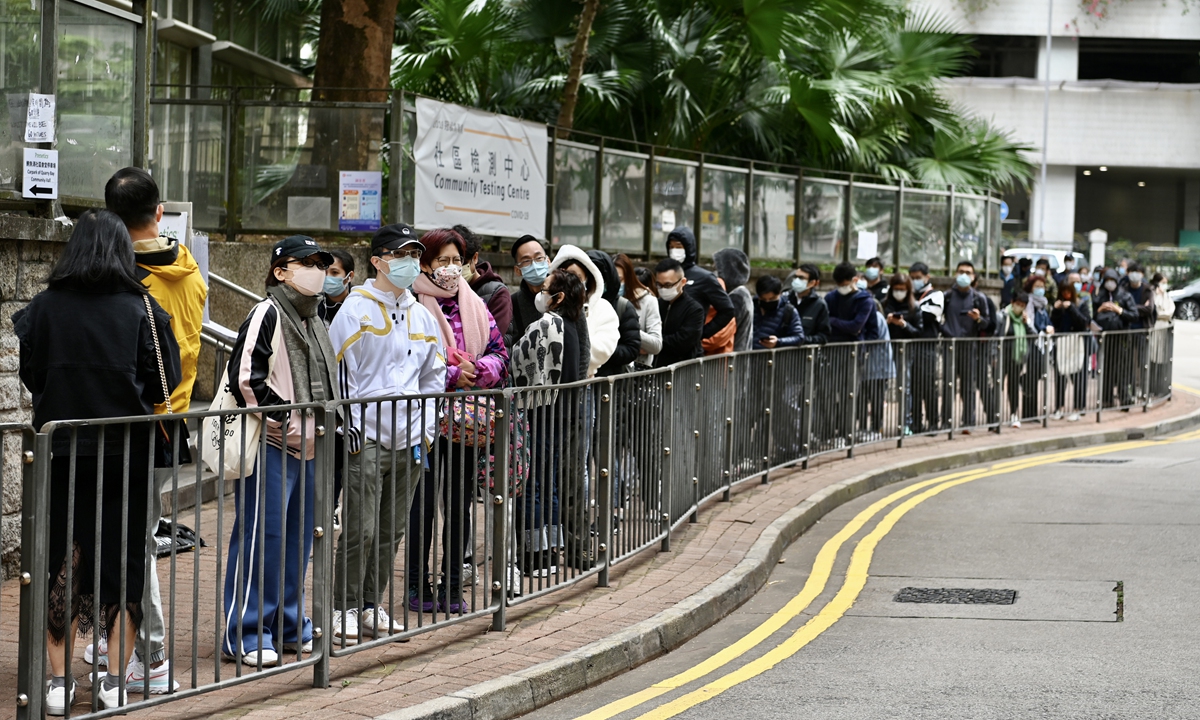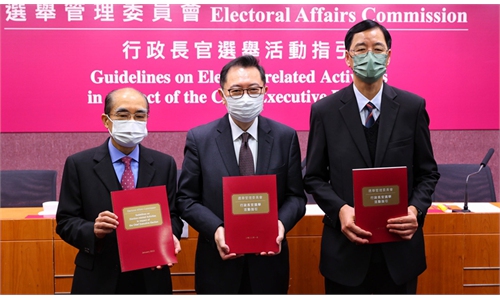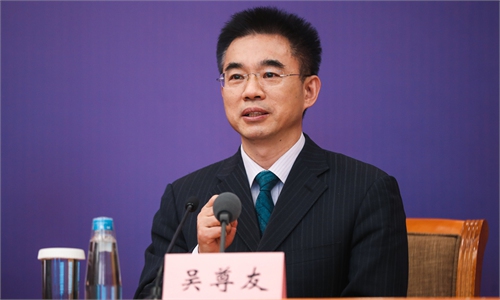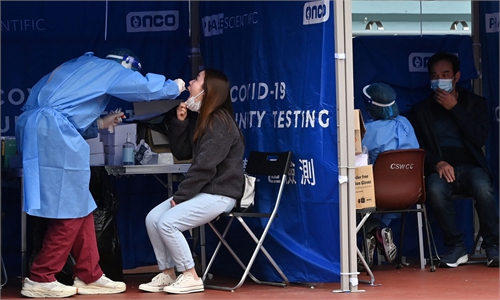
Hong Kong residents line up to take nucleic acid tests as the city battles an outbreak of the COVID-19 Omicron variant. Hong Kong confirmed 986 infections and registered another 800 primary positive cases on February 10, 2022. Photo: cnsphoto
Hong Kong is in a severe situation with the fifth wave of COVID-19 epidemic. In the past two weeks, more than 4,000 cases were confirmed in the city, while the recent daily new cases have been staying around 1,000. At present in Hong Kong, nucleic acid testing capacity cannot keep up with the situation, medical resources are saturated, and people are rushing for daily groceries. According to local media reports, some officials of the special administrative region have traveled to neighboring Shenzhen for a meeting on Saturday to seek further help of the Chinese mainland. The meeting will discuss a best way to help Hong Kong fight the latest wave of COVID-19 infections.
To gather resources as soon as possible to put the epidemic under control has become the strongest desire in Hong Kong. There are still more than 1 million citizens in the city who haven't received any dose of COVID-19 vaccine. In addition to large proportions of aged people and high density of residents, the city also faces a relatively high risk of imported infections. Some medical experts predict that by late March, the number of new cases per day could approach 30,000, which would overwhelm the health system and increase the death rate if the epidemic isn't tackled in time. All these facts demonstrate that the dynamic zero-case goal cannot be discarded, and that it is quite urgent to stop the raging epidemic.
However, Hong Kong society has its own characteristics. Within the current discussions about the virus fight, there are also voices calling for coexistence with the coronavirus, which have affected the enforcement in the epidemic fight. In the pursuit of the dynamic zero-case goal, the Hong Kong government needs to take specific conditions into consideration when it seeks adequate methods that can maximize the collective interests while minimizing the costs.
Breakthrough infections are not rare. As there is still no proven cure for COVID-19, the conditions for coexistence with the virus are not yet in place. The so-called coexistence in the West is nothing but Western governments' choice to "lie flat" as they refuse to take responsibility. It is a helpless choice after they failed to control the epidemic. More importantly, accompanying the move to lie flat comes the brutal social Darwinism, which ruthlessly eliminates part of the population especially the elderly and the vulnerable. Although Hong Kong is highly inclusive to Western concepts, it also has deep root in Eastern culture - people there value the right to life more than people in the West. Hence, giving up on the vulnerable is definitely not acceptable in Hong Kong.
An anti-epidemic policymaking must be done with a scientific attitude, in the process of which any ideological factor should be avoided. Be it the Chinese mainland's support to help Hong Kong increase its nucleic acid testing capacity in August 2020, or the discussion about QR health codes during Customs clearance, the extreme opposition in Hong Kong had created and spread rumors to slander the efforts. That has impacted the epidemic fight. And those voices are in line with Western media's demonization of the virus fight in the Chinese mainland.
The dynamic zero-case measures were proven effective in Hong Kong. In the early stage of the pandemic, Hong Kong took the West's mode, resulting in waves of infections that blew heavy strikes to the local economy and livelihood. Since November 2020, the city began to resort to the strategy of preventing imported cases and a domestic rebound in infections. As a result, no local new cases were reported in several months last year, and socioeconomic activities gradually recovered. As the Omicron variant is raging fiercely, there is no reason for Hong Kong to give up on this option.
There are a great number of voices distorting and smearing Chinese mainland's epidemic fight policies. Hong Kong should not be misguided by them. Liang Wannian, head of the COVID-19 response expert panel of China's National Health Commission, has made it clear that dynamic zero-case doesn't mean no infections. It aims to detect the infections fast and handle them quickly with precise management and control as well as effective treatment. The Hong Kong government needs to disregard some noises, promote the relevant policies, appease people's nerves, and pool resources to actively explore and implement anti-epidemic measures in line with Hong Kong's actual situation, taking a Hong Kong-style dynamic zero-case path.
The central government and society in the Chinese mainland are the strong backing for Hong Kong - as long as Hong Kong is in need, the motherland will respond. No matter it was the 1997 financial crises in Asia, or SARS epidemic in 2003, or 2008 global financial crisis, or even the violent unrest in 2019, Hong Kong overcame the challenges with the help of the Chinese central government. It is no exception this time.
Currently, the mainland has coordinated Guangdong-Hong Kong epidemic prevention, guaranteed the inter-city transport of supplies to make sure Hong Kong people will access enough fresh food and other daily necessities, and worked jointly on anti-epidemic measures. The mainland supports the Hong Kong government in taking decisive measures to firmly contain the spread of virus. In short, the motherland will always strongly back Hong Kong in times of crises.



